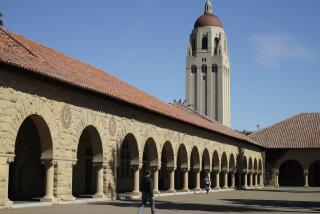Resignation Officially Accepted : Apple Undecided on Whether to Sue Jobs
- Share via
CUPERTINO, Calif. — Uncertainty continued to pervade the atmosphere at Apple Computer on Thursday as the company spent a second day without a chairman or without deciding whether it would file a lawsuit against Steven P. Jobs, Apple’s co-founder, who announced his resignation as chairman Tuesday night.
Apple executives did not officially acknowledge the resignation until late Thursday, after the 30-year-old Jobs submitted a reworded letter to the board clarifying that he has stepped down both as chairman and as a director of the nation’s second-largest maker of personal computers.
Apple’s statement on Jobs’ resignation came almost 48 hours after Jobs effectively left the company.
But one Apple executive, who said the company regretted Jobs’ departure, said he believes that the confusion was more a public relations problem than reality.
“His leaving this way fosters the perception that there is turmoil in Apple, and nothing could be further from the truth,” said William V. Campbell, executive vice president in charge of Apple sales and marketing.
Apple officials said that Jobs’ first letter of resignation, which was made public Tuesday night but was not presented to the board until Wednesday, had left open the possibility that Jobs might continue as a director of the company that he and Stephen Wozniak founded eight years ago in a Cupertino garage.
Jobs’ resignation had been prompted, he said in the letter, by his dissatisfaction over his removal in May as a manager and by the company’s reaction to his revelation last week that he had recruited five key Apple employees to join a his new computer venture.
Apple President and Chief Executive John Sculley had been scheduled to leave Thursday on a business trip to Europe. He postponed his departure until Saturday, however, because of the uncertainty created by Jobs’ departure.
Jobs has not disclosed details of his proposed venture except to say that it will involve computer sales to universities. The education market is among the fastest growing for Apple, and company officials reiterated concern Thursday that Jobs may have violated conflict-of-interest laws by recruiting employees while still chairman.
Neither Jobs nor his lawyer returned telephone calls.
The company said it is still reviewing the matter and does not know when it will decide whether to file suit.
Campbell, the only Apple executive who has been available to comment officially on Jobs’ departure, said that losing the five employees will hurt but not cripple Apple. “We have plenty of good engineers,” he said.
Campbell said he and other executives are concentrating on running the day-to-day operations of Apple and leaving the board of directors to “deal with Jobs.”
Apple executives in charge of operations “can’t stand around agonizing over this soap opera (because) we have a company to run,” Campbell added.
Jobs was effectively stripped of day-to-day duties at the company in a much-publicized company shuffle last May that reorganized product divisions into functional units defined by product development, marketing and sales.
In letters to the board this week, Jobs described his unhappiness with the reorganization, saying it stripped him of any responsibility and left him with nothing to do.
Campbell said that the board would have preferred that Jobs had stayed with the company and that it regretted the timing and circumstances of his departure.
He added that, with the Christmas season drawing near and the introduction this week of several new products, “this publicity is the last thing we need.”
Sources close to the situation said that Jobs, staying at his house in an affluent suburb behind the Stanford University campus, continues to plot his strategy.






